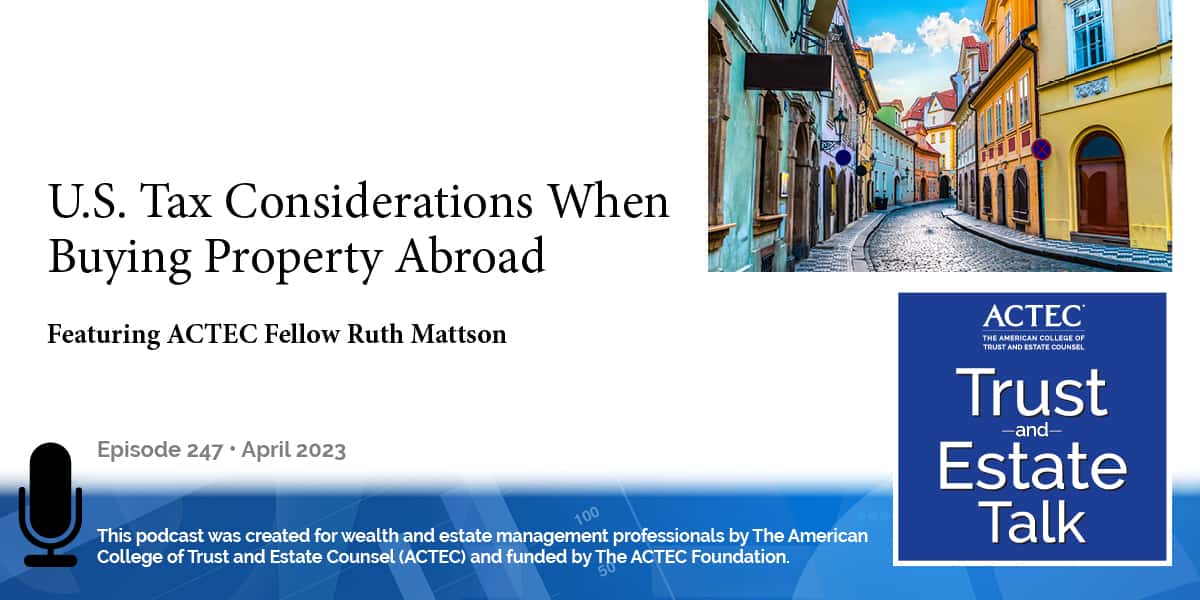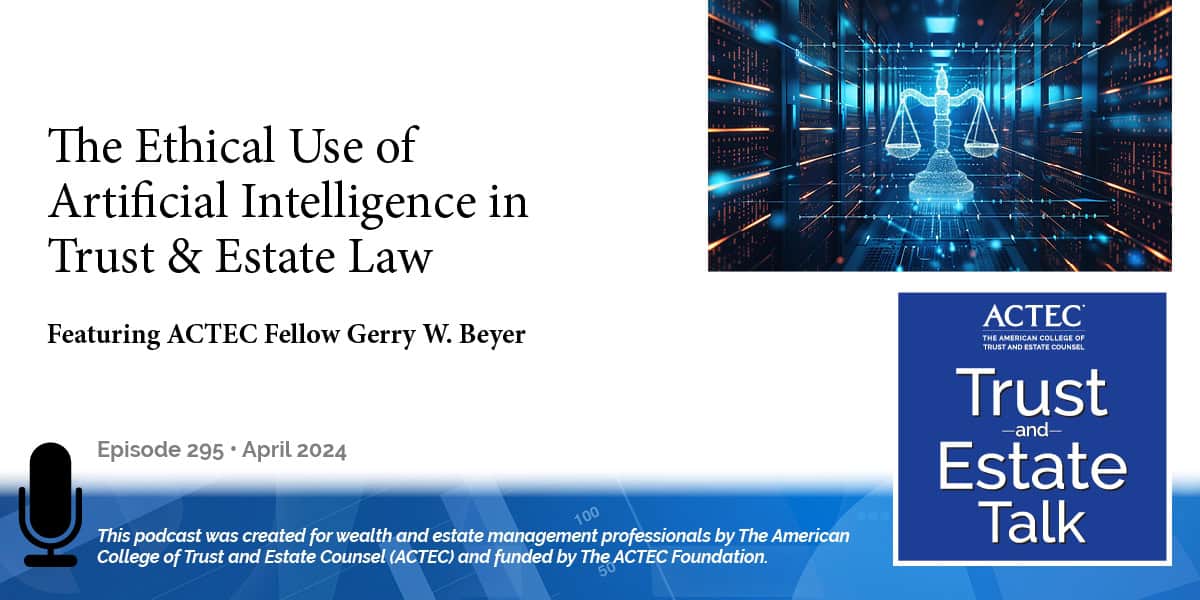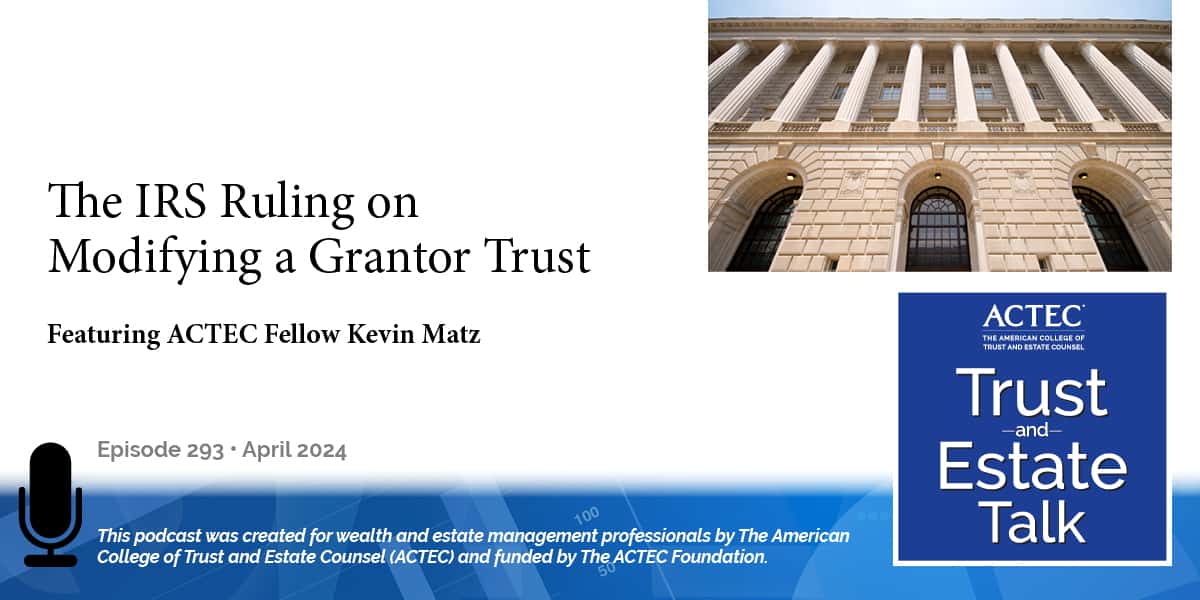U.S. Tax Considerations When Buying Property Abroad

“U.S. Tax Considerations When Buying Property Abroad,” that’s the subject of today’s ACTEC Trust and Estate Talk.
Transcript/Show Notes
This is Margaret Van Houten, ACTEC Fellow from Des Moines, Iowa. According to Statista, by the end of 2021, U.S. owned assets abroad amounted to over $35 trillion. Without proper tax planning, a vacation property overseas could become a nightmare. How should estate planning and wealth professionals advise their clients? ACTEC Fellow Ruth Mattson from Boston, Massachusetts, shares their experience on advising clients who own real estate abroad. Welcome, Ruth.
Estate Planning with Foreign Real Property: Introduction
Thank you, Margaret. I’m glad to be here. It is fascinating when clients want to purchase vacation properties abroad. It’s similar, in a way, to when clients have vacation properties in other states but a little more complex. So, once we hear about the amazing location and the town and the community, we want to make sure to follow up about the team that will be helping this client. We want to make sure that they’re going to have local counsel, and that is possibly going to include real estate counsel, estate planning counsel, and maybe tax planning counsel all in the local jurisdiction.
In fact, it’s important to get as local as possible because there can be differences in how real property is treated from one region to another, even from one town to another in a foreign country. So, you’ll get local counsel and you might find one person who can advise on all of the relevant topics, or they might need a couple of advisors. On the U.S. side, they will definitely want a U.S. accountant who knows international reporting.
It’s very important because even though real estate doesn’t necessarily trigger international reporting on a U.S. return, there are a lot of associated issues that likely do generate information reporting on a U.S. return. For example, when you transfer funds over to the foreign country to purchase the real property, that might trigger FBAR reporting, Foreign Bank Account Reporting or 8938 reporting, even for that first year. So, it’s good to have a U.S. accountant onboard right away.
Foreign Real Property: Estate Planning and Pre-planning
When the client is coming in before they purchase the property, that’s great because then, we have a chance to plan in advance. For example, the foreign advisor might recommend something that we never would’ve thought of as a U.S. advisor. My first thought when a client wants to purchase real property is I want them to hold it in a revocable trust because that’s what makes sense in Massachusetts; you want to avoid probate as much as possible.
In a foreign country, a United States trust might not avoid probate and it might create tax problems. It might create property law issues. So, we don’t necessarily want to have a U.S. trust. And, in fact, a lot of the times, I hear that they definitely do not want that property in a U.S. trust or a foreign trust. They don’t want any trust of any kind. What the local counsel might suggest instead would be some kind of a local entity. For example, in Mexico, a lot of folks will hold a home in a Fideicomiso, which is treated for United States purposes often as a disregarded entity.
Foreign Real Property: Taxes and Local Considerations
Other countries will have other typical ways of holding homes. And so, if the local advisor suggests something, what you want to do then is take that suggestion to the U.S. accountant and ask, “How is this foreign entity going to be reported for U.S. tax concerns? Are there any issues that we should worry about if the property gets rented out or at death? Or is there information reporting that’s going to be a problem?”
And here are some things that might be an issue: If you’ve got a foreign entity that could be a check the box entity. So, it could be either a corporation, or a disregarded entity, or a partnership depending on what the client prefers, then the client should be ready to file Form 8832 the first year that they report that entity on their U.S. return and that should set them up well going forward. If they’ve got something that’s going to be treated as a foreign trust or a foreign corporation in the United States, that can be a little dangerous because the forms that we need to report foreign trusts and foreign corporations in the United States, there might be no tax associated with the information that’s reported on that return, but there are late filing penalties.
And these are something we don’t think about often with income taxes. But, when we’ve got foreign information returns, if you file your Form 3520 one day late, that can lead to a 35% penalty. So, if you’ve got somebody who is going to put foreign real property into a foreign entity, and your U.S. tax advisor says, “Hey, that’s going to raise Form 3520 issues,” you want to listen to the tax advisor and be very thoughtful so that the client is not walking into a tax trap where if they’re just one day late one year, they’re going to have a 35% penalty- 35% of the value of that foreign property.
Foreign Real Property: Wills and Probate
So, tax issues aside, the other thing to think about is there could be a U.S. LLC that could hold foreign property. In some countries this is advisable because it’s really convenient and easy to have a U.S. entity, and it might be disregarded in their foreign country and in the U.S. So, you kind of have the best of all worlds. You’ve got a simple U.S. structure that is treated the same in the U.S. and in the foreign country. Sometimes, that doesn’t work because in the foreign country, it can’t be disregarded. The LLC is always going to be opaque.
When you’re planning for a client who has foreign real property, if they come in and they already have the property, and they walk in for an estate planning conference, again, my first thought is let’s pop this foreign real property into the same estate plan that I’m creating for all your other stuff. And, in Massachusetts, that would be a pour-over will with a revocable trust. But again, that’s going to be a terrible idea for a lot of countries. And, in most places, what you’re going to have to do is transfer that property by will to one or more individuals.
So then, the question is: one will or two wills? Two wills can be really handy because you can have one will for the foreign property and one will to govern all other property worldwide. The foreign will can be in the local language, it can have all the local terms for local administration. And, at death, you’ve got two different wills. So, probate can happen in two places at the same time. That seems really handy, except there’s a big fundamental problem which is that sometimes, if you have two wills floating around, they can accidentally revoke each other, or the client could update one will in a way that revokes the entire plan underneath it.
To protect against that, you can put everything into one will and that can be really handy but you’re going to have to probate it in one jurisdiction at a time. So, when drafting a will that’s going to cover foreign real property, again, you want to always consult local counsel because you want to find out what kind of taxes and expenses come up over there. And you want to coordinate your taxes and expenses. For example, if the foreign real property is going to bear its own taxes, is somebody going to have to sell that property to pay the tax? Or, if the U.S. is paying the taxes and expenses on that foreign real property, will you get the proper tax credits that you need in both jurisdictions? And then, also consider the tax implications of the client’s wishes. If the client wants to leave the property to the children, that’s great, but it might generate a higher tax; a local tax for that foreign property than if they were leaving it to their spouse.
Foreign Real Property: Life Insurance and Other Tax Implications
So, one last thought is regarding life insurance. A lot of times, you’ve got foreign real property and you want to cover the local taxes. You do this using life insurance. That’s great, that is good planning. But a foreign advisor might recommend their local foreign life insurance advisor. That might not be the best idea for a U.S. purchaser.
A U.S. person often will do better purchasing U.S. life insurance because it may be lower cost overall. But, most importantly, it gives simplicity and certainty on the U.S. tax side. The only downside is they have to come to the U.S. to get medical exams. So, if they’re somebody living overseas, it might be a little bit of a challenge. But, if they buy foreign life insurance, there could be a 1% excise tax and it might not qualify as life insurance for U.S. tax purposes. It might be taxed like a regular investment account where you’re going to pay income tax every year on that policy.
Finally, don’t put the life insurance into an ILIT (Irrevocable Life Insurance Trust) that is a foreign trust. If you’re going to put it into an Irrevocable Life Insurance Trust, make sure it’s domestic. A foreign life insurance trust will trigger Section 684 capital gains tax on the death of the grantor. That’s a lot. A lot to think about but I hope it’s helpful.
Thank you, Ruth, for that wonderful presentation.
You may also be interested in:
This podcast was produced by The American College of Trust and Estate Counsel, ACTEC. Listeners, including professionals, should under no circumstances rely upon this information as a substitute for their own research or for obtaining specific legal or tax advice from their own counsel. The material in this podcast is for information purposes only and is not intended to and should not be treated as legal advice or tax advice. The views expressed are those of speakers as of the date noted and not necessarily those of ACTEC or any speaker’s employer or firm. The information, opinions, and recommendations presented in this Podcast are for general information only and any reliance on the information provided in this Podcast is done at your own risk. The entire contents and design of this Podcast, are the property of ACTEC, or used by ACTEC with permission, and are protected under U.S. and international copyright and trademark laws. Except as otherwise provided herein, users of this Podcast may save and use information contained in the Podcast only for personal or other non-commercial, educational purposes. No other use, including, without limitation, reproduction, retransmission or editing, of this Podcast may be made without the prior written permission of The American College of Trust and Estate Counsel.
If you have ideas for a future ACTEC Trust & Estate Talk topic, please contact us at ACTECpodcast@ACTEC.org.
© 2018 – 2024 The American College of Trust and Estate Counsel. All rights reserved.
Latest ACTEC Trust and Estate Talk Podcasts

The Ethical Use of Artificial Intelligence in Trust & Estate Law
A law professor offers insights into the risks, rewards, duties and ethical considerations of lawyers using AI in their T&E practices.

What Is Artificial Intelligence and the Impact on T&E Law in 2024 and Beyond?
A primer on the types and uses of AI, then a deeper dive into the impact on trust and estate law from types to applications to ethical considerations.

The IRS Ruling on Modifying a Grantor Trust
Explore the gift tax implications for trust beneficiaries modifying grantor trusts in IRS CCA 202352018, with nuanced analysis and estate planning insights.

